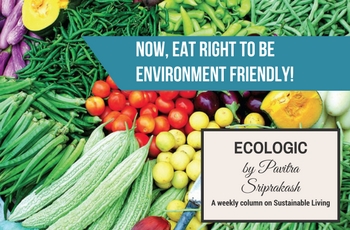17 Jun 2017, New Indian Express: ECOLOGIC- Pavitra Sriprakash, the Chief Designer and Director of Shilpa Architects writes about sustainable gastronomy and food production.
Full Article (below) – Link to New Indian Express site | PDF
“Celebrate!” all you self-proclaimed foodies; UN has designated June 18 as the Sustainable Gastronomy Day! Food production and consumption have an important role in achieving the Sustainable Development Goals that were agreed by 193 countries at the Rio+20 Conference held in 2012 at Rio de Janeiro, Brazil. One of them relates to food, and links three of its dimensions: Promotion of agricultural development, food security and nutrition; Sustainable Food Production and Conservation of Biodiversity. Eco-gastronomy is about the study of interactions between humans and food. We have to review our relationships so we can adequately feed people with better food; now and in future too.
India is an agricultural country with a majority of its workforce (~50- 65%) in farming and allied activities. The Union Ministry of Agriculture and Farmers Welfare is concerned with production and cooperation in agriculture, livestock, fishing and food processing. Focused on agricultural development through education, many regional centers have been setup throughout the country to teach farmers. Several new varieties of cereals, pulses, oilseeds, forages and cash crops have been released by the Indian Council of Agricultural Research. They are developed to be drought tolerant, and to do with less pesticides and organic fertilisers. These measures have increased yields with improved nutrition, and also bolstered our nation’s food security.
Sustainable Food Production or “green farming” reduces the impact of farming on the environment by raising water efficiencies using drip irrigation, conserving energy with solar powered pumps, capturing and storing rainwater and scheduling irrigation needs. Soil conservation practices such as augmenting the topsoil with organic matter through crop rotation, reduced tillage, mulching or cover cropping prevents soil degradation. While conventional agriculture uses chemical based pesticides and water-soluble synthetically purified fertilizers, organic farming uses natural pesticides and fertilizers. A recent survey in Netherlands found that consumers increasingly buy organic or eco certified products with a lesser carbon footprint. It also motivated ‘sustainable food behavior’ such as curbing red meat consumption through one ‘meat-free’ day a week or eating smaller portions.
When it comes to biodiversity conservation, a great example is that of the Amazon Rainforests. A biologically rich area, its lands and waters have over 40,000 varieties of plants, 3,000 species of fish and 3,000 kinds of fruit. However deforestation is rampant for cultivating soybeans, cocoa, oil palm and raising beef cattle. They cause soil erosion and nitrogen rich fertiliser run off into rivers which have a devastating impact on the entire Amazonian ecosystem. Sustainable gastronomy uses produce from the rainforest sensitively, which saves and preserves their rich biodiversity. This movement has been gaining popularity across countries over the past decade.
Eating well is not about enjoying food; but also about understanding its secrets, protecting biodiversity and securing our future food sources. It is all about getting healthier food while reducing environmental impact on both the productive and consumptive sides. When at a local restaurant or grocery store, think before you choose. Consuming local products or homegrown dishes ensures a high sustainability quotient, and tangentially promotes eco-gastronomy. Embrace your inner foodie, but remember what you eat and how you eat could keep you, your family and planet healthy — “Bon Apetit!”



